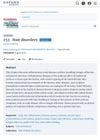Alopecia Areata in a Rhesus Monkey (Macaca Mulatta)
April 2007
in “
Journal of Medical Primatology
”

TLDR The monkey's hair loss was due to an autoimmune disease, not genetics.
In 2007, a study investigated alopecia universalis in a 14-year-old female rhesus monkey named Kojack, aiming to understand the causes of her hair loss. The comprehensive health assessments, including clinical examination, hematology, serology, and skin biopsies, determined that the alopecia was not caused by a genetic mutation but was a T-cell-mediated autoimmune disease similar to human alopecia areata universalis. Histological examinations revealed chronic lymphocytic perifolliculitis and folliculitis in anagen stage hair follicles, and immunohistochemistry showed perifollicular infiltrates with CD4-positive T cells. The study, supported by the Alopecia Areata Deutschland (AAD), suggested that rhesus monkeys could be a valuable model for studying alopecia areata in humans.










